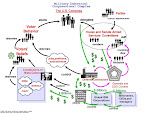The achievement of 1787 was to design an oligarchy that has been stable for 230 years without a monarch. But it failed to protect us against oligarchy, or the present power system of NY-WashDC composted of corporations, public agencies, financial houses, military commands, etc.
We could have direct democracy (individuals vote on every significant policy decision-- at the *policy* level, the structural level. And we could, with the Internet, be enabled to change and update our votes on a continuous basis over time).
And since the world is complex, there's *no possibility* that individuals can make competent, rational choices on policies that affect them. This fact must be corrected by formal, constitutional process. For example, the federal government might be composed of 30 different agencies, similar to existing departments of transportation, environment, education, food, public health, defense, etc but many more, for example, budget, and public information. Each agency would be governed by a congressional committee which would be "tightly coupled" with its agency. All policy would be authored by the relevant agency and its governing committee.
There might not be any president at all. Who needs that guy? And there might not be any general "congress", at all, pretending to understand, know and guide everything as a whole. Which they never did, very well. Just the 30 governing committees for different aspects of the country.
Furthermore, voters would be voting on these complex and detailed operations. We would *need* the right to appoint specialists we trust-- Experts --as proxies to vote our votes on complex things like technology, medical care, pharma, finance, etc. There would be no elections for these proxies-- you could appoint anybody you like, but they might need to meet some qualifications, for the sake of everybody else in the country, not just your religious leader, your mother, etc. They could be accountable to professional licensing boards for each 30 domains, to pass tests, take continuing education, etc like other professions.
Basically I want all significant policy *choices* to be thoroughly well explained and documented in the clearest, unambiguous language. The development of this semantic framework is one of the biggest tasks. This would require some formal structure of linguists, perhaps lawyers, but deeply wise people to define the legal meaning of words, and phrases and the underlying realities of legislation. Do you understand the goals of this? It is to make voters' policy guidance exactly clear. And this would require very significant amounts of money for staff, continual investigation of agencies and definitions of the problems.
Because legislation would be exact, there would be less need for courts or high level apparatus in federal agencies to interpret or implement the law. The constitution and legislation would be properly written to anticipate problems and resolve them up front, or kicked back by the 30 agencies to their Committees' to clarify.
Basically I want to *see* the real legislation and have the right to vote on it, and expect this to happen about 100 times a year. I also want the right to delegate my vote or proxy, to experts in particular domains of expertise who I trust, for 20 or 30 categories like medical, transportation, military, foreign relations, energy, housing, toxics, climate change, etc. We MUST stop appointing one single politician for long terms of years, to decide EVERY policy that affects our lives, since they cannot possibly be expert in more than one or two of those domains.
Sunday, November 4, 2018
Subscribe to:
Posts (Atom)
